

By Making Hand-Drawn Maps of Their Slums in India, Kids Are Influencing Urban Planning Policies. Every kid likes to draw.
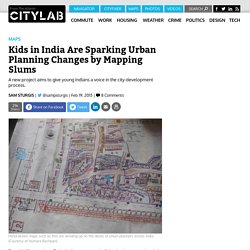
But in India, young people living in slums are using their sketching skills to spur urban change. As part of a broader civic campaign centered on "child clubs," groups of children are creating detailed "social maps" of their marginalized neighborhoods to voice their concerns about public space, as first reported in Citiscope, a CityLab partner site.
Since 2011, UNICEF has been encouraging kids to use mobile technology and open data to map environmental and health issues near their homes. But that technology isn't available to everyone. Instead, much of the child-led mapping campaign sweeping India today relies on old-school topography materials—paper and a rainbow-spectrum of markers. Teams of young mappers and adult facilitators spend roughly 45 days traversing their slums. "What they make is their dream aspirational map," Aishwarya Das Pattnaik, a staff member of Humara Bachpan, the organization leading the campaign, says. Dropcanvas - instant drag and drop sharing. Cowork on a Catamaran sailing the world with Cobat - The travel diary. At this point, we’ve heard it all: You can cowork in a castle, you can cowork in a van.
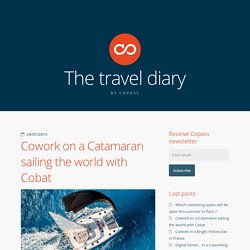
You can cowork in a factory, you can cowork in an arsenal. You can cowork on a farm, you can cowork on a bus you can work in a shipping container and you can cowork on a tropical island. Now, you can cowork on a catamaran sailing the world. “Don’t differentiate between “This is a job” and “This is what I’m doing for fun.” With wind and solar-generated power, this boat can comfortably cowork 20 entrepreneurs.
It hosts all the amenities of your by-the-book coworking space – power charging stations, fast and steady wifi connection – plus some others, like equipment for water sports and fully equipped kitchen and bedrooms, you’ll feel at home quickly no matter where in the world you might be going. There, you’ll also have the support of crew members, organizations and vested third parties who will travel along with you. So, want to go? Publish data for a WebMapping application using PostGIS and Geoserver. Curso en línea gratuito sobre Gabo.
¿Es efectivo aprender por internet?
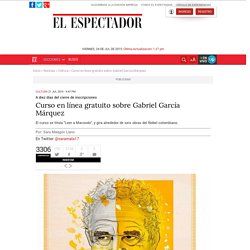
¿Qué ventajas y desventajas, en comparación con un curso tradicional, tiene uno que sea masivo y en línea? Estos son los retos que enfrentará la próxima semana la Universidad de los Andes con el lanzamiento del primer curso en línea en toda Latinoamérica en la plataforma FutureLearn.Aunque la Universidad de los Andes viene trabajando hace 15 años en temas de educación mediada con tecnología, el 27 de este mes lanza el primer curso masivo y gratuito en línea. “Leer a Macondo” ( está a cargo de cinco profesores del departamento de Literatura que, durante seis semanas, guiarán el estudio de seis obras literarias de Gabriel García Márquez.
Esta tendencia de los MOOC (Massive Open Online Course) no es reciente. Este es el primero de los siete u ocho cursos que la universidad planea publicar este año, desde otras disciplinas. El tiempo estimado que un inscrito debe dedicarle al curso son seis horas semanales, dedicándoselas como quiera o cuando pueda.
Earnings and wages - Gender wage gap - OECD Data. Digital Geography. Google Maps retrace tous vos déplacements dans une nouvelle fonctionnalité. Gentrificación en Reconstrucción. Beauty From Around The Globe - Page 25 of 41 - Cyber Breeze. Put the “Ph” Back in PhD - Rethinking - Forum - Summer 2015 - Johns Hopkins Public Health Magazine. Rethinking We need big thinkers, but the current system teaches students to think small.
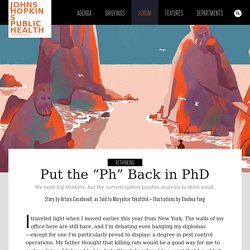
Story by Arturo Casadevall, as told to Maryalice Yakutchik • Illustrations by Xiaohua Yang I traveled light when I moved earlier this year from New York. The walls of my office here are still bare, and I’m debating even hanging my diplomas—except for one I’m particularly proud to display: a degree in pest control operations. My father thought that killing rats would be a good way for me to make a living. Some 30 years later, I feel the same way about science and the way we prepare scientists. My goal is to put the Ph back into a PhD. Ambitious and provocative as revamping the PhD may sound, it’s actually just one part of a sweeping reform of scientifıc methodology, culture and structure that I am advocating.
It’s abundantly clear that in many respects it is not. Real reform requires a culture change, one that obliges us to get to the root of the issue: education. The time is right. Epistemology. Pope Francis the urbanist. VATICAN CITY — When Pope Francis issued his much-noticed encyclical last month, it was his call for action against climate change that grabbed headlines.
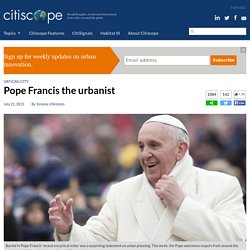
But buried deep in the 184-page letter was a surprising statement on urban planning. In a section of the document called “Ecology of Daily Life,” Francis focused on the importance of cities, neighborhoods and public spaces as places to create and preserve quality of life and a sense of belonging. He highlighted the need for better housing and to integrate slums and rundown neighborhoods “into a welcoming city.” He even touched on the need for better mass transit. (Read an excerpt of this section of the Pope’s letter here.) This week, Francis will dive even deeper into urban policy.